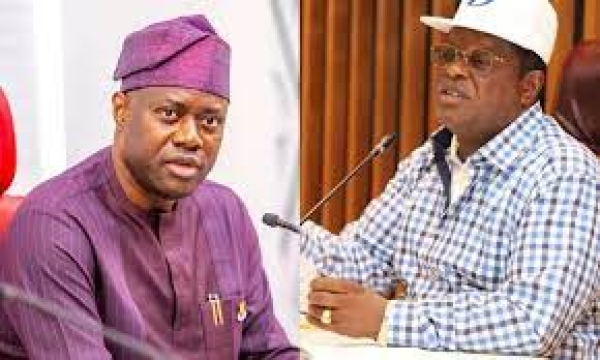797
By Oscar Okhifo
Minister of Works, Engr. David Umahi, has fired back at Governor Seyi Makinde of Oyo State over his criticism of the cost of Federal Government road projects, declaring himself Makinde’s senior both in engineering and governance.
Umahi, a former governor of Ebonyi State, made the remark while inspecting the Keffi section of the Abuja–Mararaba–Keffi Road project in Nasarawa State, alongside Governor Abdullahi Sule.
The Minister was reacting to Makinde’s recent comment accusing him of “dancing around” the question of the cost per kilometre of the Lagos–Calabar Coastal Highway project.
“Let me make it clear. I am an A student in Mathematics. I’m also his senior in engineering and his senior in governance. So when people like that speak, I take it with understanding, but I don’t like it when people make ignorant remarks about technical matters,” Umahi said.
He described it as misleading for anyone to simplify road construction costs by dividing total project figures by kilometres covered, noting that such an approach ignores key engineering variables.
“Road construction is not about dividing the total cost by the number of kilometres. Each section of a road differs in terrain, soil condition, drainage system, and design specifications. Some portions have bridges, some have retaining walls, some have median barriers, and some use concrete pavement. So you cannot have a uniform cost per kilometre,” he explained.
Umahi challenged the Oyo State Governor to a public technical debate if he believed the Ministry of Works was evading transparency on project costing.
“If Governor Makinde insists that I’m dancing around the cost issue, let him come for a debate. I’ll explain to him the entire cost breakdown of the Lagos–Calabar Coastal Highway and why it is structured the way it is.
” But I advise him to withdraw that statement because it was not made from an informed position,” Umahi added.
He further clarified that government projects include contingency provisions and Value of Project (VOP) adjustments to account for inflation, design variations, and market fluctuations.
“Costing a road project before completion is only an estimate. It is at completion that we can determine the final average cost. Before then, several variables are at play, including exchange rate, material cost, and design review,” he said.
Governor Makinde had earlier faulted the Works Minister for allegedly failing to provide clarity on how much the Federal Government is spending per kilometre on the ₦15 trillion Lagos–Calabar Coastal Highway project.
The exchange has stirred nationwide debate over transparency and accountability in public infrastructure spending. While some Nigerians back Makinde’s demand for openness, others agree with Umahi that technical considerations make uniform costing impractical.
Umahi, however, maintained that his ministry remains transparent and focused on delivering durable, long-lasting roads across the country.
“I’m not in office to play politics. I’m here to work and show results. The Lagos–Calabar Highway is a legacy project that Nigerians will be proud of when completed,” he said.
Yet, Umahi’s capacity may not be the elephant in the room, his opacity is. He is not alone.
There is too much opaqueness in Nigeria’s procurement, contract bidding, and projects funding systems.
Public Officials hardly explain processes fully or lucidly, and when challenged, they often become defensive rather than transparent.
The system has become one where public officials are perpetually dagger-drawn against accountability. They run down inquisitive journalists and sometimes deploy subtle threats.
Analysts and civic groups have continued to call for full disclosure of contract details, including funding sources, bidders, and project timelines, to restore public confidence.
They insist that transparency, not defensiveness, remains the cornerstone of good governance and effective public service delivery.
The Lagos–Calabar Coastal Highway, one of the Federal Government’s flagship projects, spans about 700 kilometres and is designed to link Lagos to Cross River State through several coastal communities. Construction is ongoing on the initial sections of the project.



